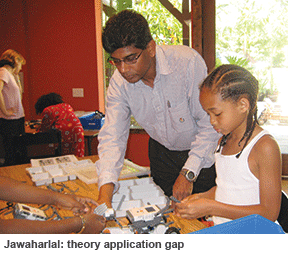 California-based Dr. Mariappan Jawaharlal is co-founder of STEM (Science, Technology, Engineering and Math) Center India (estb. 2012). A start-up headquartered in Chennai, it offers primary-secondary students experiential hands-on and minds-on robotics programmes designed to make learning enjoyable while simultaneously developing their creativity, critical thinking and problem solving skills.
California-based Dr. Mariappan Jawaharlal is co-founder of STEM (Science, Technology, Engineering and Math) Center India (estb. 2012). A start-up headquartered in Chennai, it offers primary-secondary students experiential hands-on and minds-on robotics programmes designed to make learning enjoyable while simultaneously developing their creativity, critical thinking and problem solving skills.
Newspeg. Dr. Jawaharlal was recently in Bangalore to launch STEM Center’s second creativity lab in the city, and fifth countrywide. Bangalore’s first lab was inaugurated last October. STEM’s other labs are sited in Chennai, Madurai and Ahmedabad.
Thus far, 25 schools and 1,200 children across India have signed up for the center’s three-month robotics programmes, designed for children in the 5-16 age group and offered after school hours for two hours weekly with students given the option to use STEM creativity labs. The STEM robotics curriculum includes controlling a robot through pre-programmed commands and gradually learning to construct robots and program them independently.
Under Dr. Jawaharlal’s mentorship, STEM Center’s co-founders — daughters Melissa, an alumna of Edinburgh, and Southern California universities, and Lavanya, a mechanical engineering student of the University of California, Berkeley — have developed an efficient and low-cost ‘Pi-Bot’ robotics kit used widely in STEM curriculums.
Fees. Rs.6,000-7,000 (quarterly)
Direct talk. “Our robotics curriculum enables students to apply theoretical learning as teaching-learning in India tends to focus on theory rather than application. In our programs, we present students with real world problems which cannot be solved through ‘step-wise’ theoretical processes. People don’t learn by listening and reading as much as they do by doing,” says Dr. Jawaharlal, an alumnus of Peoples’ Friendship University of Russia and University of Massachussets, Amherst, and currently professor of mechanical engineering at California State University, who devotes his spare time to developing STEM Center India. “Through our programmes we want to bridge the huge gap that exists between theory and application,” he adds.
Future plans. Dr. Jawaharlal believes Indian students are brilliant at retaining theory but lack the opportunity to practice application in the real world. “By 2020 STEM India plans to launch 100 creativity labs countrywide and introduce its programmes in rural India,” he says, enthusing about the journey ahead.
Prayank (Bangalore)
SAAP designer
Prof. Michael Thorne is the vice chancellor of Anglia Ruskin University, UK (ARU, estb. 1858). With a student population of 36,000, ARU is one of South-east England’s largest public universities, and is spearheading the South Asia Anglia Partnership (SAAP, estb. 2013). SAAP is a common forum for vice chancellors of universities in India, Bangladesh, Pakistan, Sri Lanka and the UK to share best practices and work together to collaborate, innovate and enhance the learning experiences of their students in the newly emerging globalised world.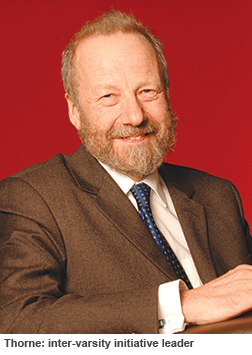
The convenors of SAAP first met in Delhi in April, 2012 and subsequently in Cambridge, UK last September when the partnership was formalised and the name South Asia Anglia Partnership agreed upon. Indian universities which signed up include the Amrita Institute of Medical Sciences (Kochi), Bharathiar University (Coimbatore), University of Calcutta, Chitkara University (Chandigarh), D.Y. Patil University (Kolhapur), University of Mumbai and the University of Mysore.
Newspeg. An enthusiastic proponent and driver of the SAAP initiative, Prof. Thorne was recently in India to attend the 2nd annual conference of SAAP hosted by Mysore University on November 18-19. SAAP member-delegates discussed and deliberated on the role of universities and resources mobilisation. Earlier in March, Prof. Thorne was in Mumbai to sign a memorandum of understanding (MoU) with the University of Mumbai which focuses on promotion of music therapy — one of Anglia Ruskin’s “world leading research areas” targeted at helping people suffering from dementia, and other mental health problems, as well as autistic children.
Direct talk. “The government of India has set a 30 percent gross enrolment target by 2020, which translates into 40 million university seats — an increase of 14 million over the next six years. This ambitious target is certain to create a scarcity of qualified academics, drive up teacher-student ratios and force a shortage of research output in terms of quantity and quality.
Education institutions in the region are experiencing similar opportunities and challenges but until the creation of SAAP, there was no regional higher education forum to discuss ways and means to meet these challenges and share experiences and expertise. Anglia Ruskin is proud to lead this initiative to bring institutions in India and other South Asia countries together to focus on these issues,” says Thorne, who began his career as a lecturer at University College London followed by a decade at Cardiff University, which he left to assume administrative duties in Sunderland and Napier universities prior to being appointed vice chancellor of ARU in 2007.
Future plans. SAAP has a busy schedule ahead — curriculum development, mastering technologies, upgrading teaching and stepping up research output. “SAAP will explore these themes through a series of workshops and review meetings in India and the UK, and we will continue to expand this forum through new partnerships and relationships,” says Thorne.
Fair winds!
Paromita Sengupta (Bangalore)
Hospitality education driver
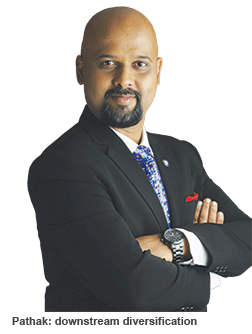 Vivek Pathak is the founder-director of Kolkata-based NIPS School of Hotel Management (estb. 1993), which offers undergraduate, postgrad, and diploma programmes in hospitality management. The school currently has 540 students tutored by 22 faculty on its muster rolls.
Vivek Pathak is the founder-director of Kolkata-based NIPS School of Hotel Management (estb. 1993), which offers undergraduate, postgrad, and diploma programmes in hospitality management. The school currently has 540 students tutored by 22 faculty on its muster rolls.
Newspeg. In November, NIPS laid the foundation of a fully-fledged business-cum-training hotel on a plot adjacent to the institute which will admit its first customers in 2016.
History. The NIPS School was promoted 20 years ago with a first batch of 40 students and five teachers by Pathak, an alumnus of the Indian Institute of Social Welfare and Business Management, Kolkata and Centre for Tourism, Hospitality and Culinary Management, UK, who acquired valuable professional experience in Taj Bengal, Kolkata. Since then, the NIPS School of Hotel Management, housed in a 20,000 sq. ft three-storied building in Salt Lake City, has been developed into arguably eastern India’s top hospitality institute equipped with six spacious classrooms, a conference room, e-library, food and beverages lab, simulated restaurants, coffee shops and hotel rooms which can educate and train 1,600 students.
The school also offers short-term skill development programmes in hospitality management in partnership with the Central and West Bengal state governments. With its study programmes approved by the All India Council of Technical Education (AICTE) and given NIPS’ affiliation with the West Bengal University of Technology, its certification is accepted worldwide. Today, more than 60 percent of its alumni are working abroad with blue-chip corporates including Qatar Airways, Emirate Airlines and Disney Cruiselines among others and with Jet Airways, Leela Palace, Bangalore, JW Marriot, Chennai, ITC Sonar Bangla and Oberoi Grand, Kolkata, and Intercontinental Mumbai hotels in India.
Direct talk. “Our curriculums are a blend of India’s rich heritage and culture and Western hotel and hospitality management practices. This enables NIPS students to acquire world-class contemporary education in the hospitality sector and shapes them into skilled professionals and industry leaders,” says Pathak.
Future plans. With NIPS growing apace and set to enter into its “adult years”, Pathak has chalked out a series of downstream diversification plans. “During the next two years, we will replicate NIPS in all eastern and north-eastern states and establish boutique hotels staffed by our graduates in major cities of the region within the next five years. With national economic growth likely to pick up, there will be a spurt in domestic business travel. We want to be prepared for it,” says Pathak.
Way to go!
Baishali Mukherjee (Kolkata)
Uppal’s honour
A history postgraduate of Delhi’s St. Stephen’s College, Vanita Uppal is principal of The British School (TBS, estb.1963) where she started teaching history in 1991. In 2008, she was appointed principal of the secondary school after serving as dean of students and deputy principal. The school offers the IGCSE programme of the Cambridge International Examinations, UK, and the IB diploma programme of the International Baccalaureate Organisation, Geneva, at the senior secondary level. TBS currently has 860 students on its muster rolls..gif)
Newspeg. On November 18, the British government bestowed the Order of the British Empire (OBE) upon Uppal with Sir James Bevan, Britain’s high commissioner in India presenting the award on behalf of Queen Elizabeth II, in New Delhi. Uppal is one of eight foreign nationals who have received the OBE this year and the only Indian serving principal to be bestowed the honour conferred by the Queen upon civilians for distinguished public service. “Although the award is a welcome acknowledgement of my work at TBS, it’s a huge honour for the entire school and what it stands for and inspiration for all of us to set our sights higher,” says Uppal.
The British School. Managed by The British School Society with the British high commissioner as ex officio president of the society, over the past half century TBS has acquired an excellent reputation. In 2009, the last year before diplomatic corps schools were eliminated from the annual EW India School Rankings, TBS was ranked #6 countrywide among international schools. Currently, the school’s 860 students are drawn from 60 nationalities with 30 percent from the local Indian community.
“The multicultural diversity of our students is our core strength and unique feature. It enriches our curriculum and prepares students to live, work and succeed in the emerging globalised world,” says Uppal.
Future plans. Set in a 6.5-acre plot in upscale Chanakyapuri, last year TBS moved into a new building with a built-up area of 300,000 sq. ft housing 65 state-of-the-art fully-wired classrooms with a maximum class size of 22 students. Over the next two years, the school’s management is set to complete phase II of the building which will bring in “superb additional facilities” including a new swimming pool, arts centre, theatre and dance facilities and IB centre. “In the next few years as development work is completed, TBS aims to reach its full capacity of 1,350 students,” says Uppal.
TBS, which claims to offer “the finest British and international education with an Indian soul”, seems to have struck deep roots, and is set to flower.
Autar Nehru (Delhi)
PWDs champion
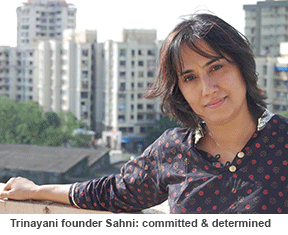 A professional vocalist and co-founder of the Mumbai-based NGO Trinayani, Ritika Sahni is passionately committed to empowering persons with disabilities (PWDs) with training and livelihood opportunities while educating and sensitising the public to people with special needs. Since it was registered in 2006, Trinayani has placed 40-50 PWDs in industry, has conducted around 250 disability awareness and teacher training workshops, and produced audio messages and films on disability-related issues.
A professional vocalist and co-founder of the Mumbai-based NGO Trinayani, Ritika Sahni is passionately committed to empowering persons with disabilities (PWDs) with training and livelihood opportunities while educating and sensitising the public to people with special needs. Since it was registered in 2006, Trinayani has placed 40-50 PWDs in industry, has conducted around 250 disability awareness and teacher training workshops, and produced audio messages and films on disability-related issues.
Newspeg. Last month, visually challenged reflexology massage therapists trained in the NGO’s Sparsh Foot Spa were contracted by the city’s Oberoi Mall, to offer this service to the public. Over the past two months, Trinayani has conducted disability awareness and sign language workshops for cosmetics giant L’Oreal and Delhi Public Schools in Pune, Coimbatore, Patna and Ludhiana.
History. A graduate in deaf education of the Ali Yavar Jung National Institute for the Hearing Handicapped, Mumbai, Sahni began volunteering with the Manovikas Kendra Rehabilitation and Research Institute, Kolkata while still a student. Subsequently, she signed up with the Indian Institute of Cerebral Palsy and Oral School for the Deaf — both in Kolkata. In 1999, the aspiration to develop her music talent prompted Sahni to move to Mumbai. While pursuing her musical dream, she continued her work with disabled people and served as head of the speech and language department of the Spastics Society of India (now ADAPT), Mumbai.
Thoroughly committed to the cause of PWDs and determined to ensure they are given their rightful place in society, this musically gifted activist uses the audio-visual and cultural media — films, radio shows, theatre, music, dance and poetry — to popularise Trinayani’s cause and messages. Recently, the NGO’s 30-second film Leave No One Behind was repeatedly telecast by several television channels including Doordarshan, News X, 9 X, CNBC, TV18, and Movies Now while its 15-minute weekly radio show, Mud Mud Ke Na Dekh, is in its third season (All India Radio and 107.1 FM Rainbow Mumbai).
Direct talk. “Films, radio shows, theatre and music are powerful media through which we can break down stereotypes about PWDs, promote their greater acceptance in corporate organisations, media, banks, education institutions, government and the professions. Through intensive workshops, we generate awareness about disability issues, and advise corporates on ways and means to make companies more inclusive. We also facilitate the employment of PWDs,” says Sahni.
Future plans. Sahni and her team have ideated new ways of spreading Trinayani’s messages to the public, especially education institutions, in the new year. A three-part ‘e-module’ providing insights into the lives of disabled people is being designed for schools. “On the drawing board is a game similar to Monopoly for students around the theme of barriers which hinder and inconvenience PWDs, while exploring solutions to remedy them. The creative arts, especially music, will feature prominently in all my future endeavours to inspire people to understand, enable and empower PWDs to live happy, productive and fulfilling lives,” she says.
Wind beneath your wings!
Indrajit Dutta (Mumbai)
Easy economics teacher
Delhi-based Sher Mehta, an economic forecasting and applied economics postgraduate of Kingston University, UK and University of Antwerp, Belgium, is founder-CEO of India’s first Macroeconomics School — “an online global school of macroeconomics with a vocational orientation” — which offers short-term online courses in the subject.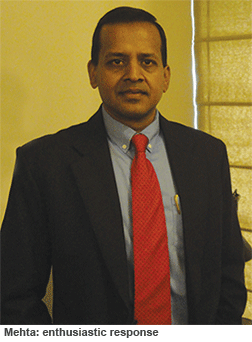
Newspeg. On October 13, the Macroeconomics School was officially launched with a 180-hour online course comprising 10 modules, covering subjects such as GDP (gross domestic product), inflation and the AD-AS (aggregate demand and aggregate supply) model. Currently, 60 professionals and students are enrolled in the school’s online study programmes.
According to Mehta, the objective of the “online school of economics for non-economists” is to equip professionals, managers, investors and students with sufficient knowledge of economics to cope with rapid changes in the domestic and global business environments.
History. An economics graduate of St. Xavier’s College, Mumbai, Mehta began his career in consumer research with CCMC, a Mumbai-based consultancy firm, in 1994. After acquiring six years of valuable experience in consumer and market research, in 2001 he signed up for a Masters degree in applied economics at Kingston University and subsequently worked with several top-notch companies in London including media powerhouse WPP, London Transport, South-eastern Railways and CERAF Economic Research Centre. In 2013, he returned to India and set up the Macroeconomics School.
“With my experience of over 17 years as an economist tracking the performance of economies worldwide, I realised I was well-equipped to provide utilitarian training in macroeconomics to Indian business managers,” says Mehta, who is also a member of the American Economic Association and the Chinese Economists Society.
Direct talk. “Macroeconomics is considered a highly technical and mathematical subject which cannot be related to fast changing business environments. In our online course, we have simplified macroeconomic issues related to GDP, inflation, unemployment, interest rates etc to make them applicable to everyday business management problems and situations. The course curriculum focuses on explaining this subject in a non-technical and digestible manner, so that business professionals can apply macroeconomics in their workplaces,” explains Mehta.
Tuition fee. The online course is priced at Rs.5,000.
Future plans. Encouraged by the enthusiastic initial response, Mehta intends to add more courses to the school’s portfolio. “We will be introducing more online study programmes. In addition, collaboration opportunities with international and national organisations are being evaluated to maximise our reach,” he says.
God speed!
Somdev Thakur (Delhi)